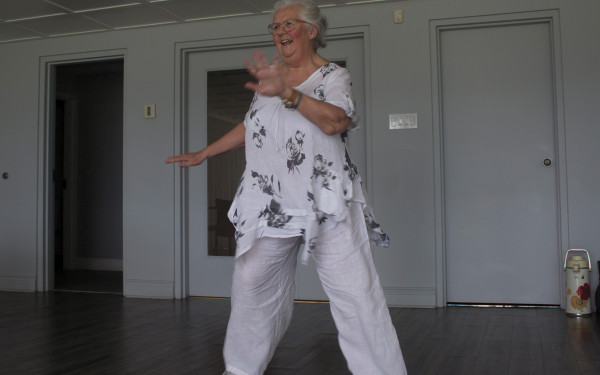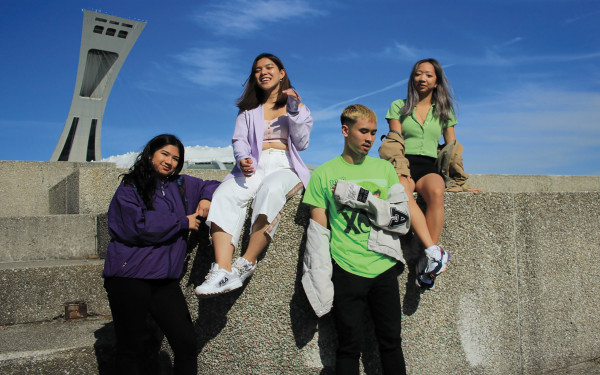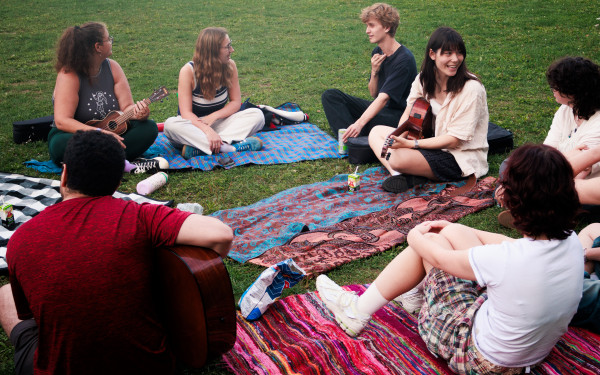Songs in the Square
Occupy Montreal Gets Musical
Take it from me—playing a steel-stringed acoustic guitar when it’s cold outside really sucks.
The skin on your hands dries out and becomes brittle. The knuckles on your right hand chafe pretty badly if you miss the strings with your pick. Hit those suckers hard enough, and it’ll feel like you just banged your fingers into razor wire.
On your left hand, the steel bites into the tips of your digits. If you haven’t played in a while, you don’t have the calluses you’ll find on any self-respecting axe-wielder. On a really cold day, the skin on your fingertips can peel back like an orange.
You have to be getting paid a pretty decent amount to make it worthwhile. Or you must have some pretty damned good reasons to be sitting in the dark on an early November night in Canada, strumming along and singing about peace and understanding.
And yet, as the sun set on Occupy Montreal on Saturday, as volunteers washed a motley assortment of dishes in soapy water, and others hunkered down after a lengthy march through downtown, frozen fingers bashed out chords in Victoria Square.
Numb palms tapped bongos, one guy took the ‘more cowbell’ meme and ran with it, and somehow, a PA got rigged up, and an electric mandolin was plugged in.
Welcome to Occupy Montreal: The Musical.
It would be trite to tell you about the long history of music in protests and social justice. If you think that Bob Dylan’s “Hurricane” and “Blowin’ in the Wind” are about the weather, bless your soul, but put down this newspaper and get back to your copy of LMFAO’s latest tour de force.
Music has been playing an important role at Occupy sites around the Western hemisphere, from a rumored Radiohead Concert at Occupy Wall Street (which never materialized) to Rage Against the Machine guitarist Tom Morello popping up at locations on both coasts (New York, San Francisco and Los Angeles).
It’s keeping up morale, but also giving people something to rally around.
“Well, there’s never been, in the United States, a progressive, radical, or revolutionary movement that hasn’t had a great soundtrack,” Morello told ThinkProgress.org. “The Civil Rights movement, the workers’ rights movement [and up to] the anti-war movement.”
While Morello has been working for the past few years under the name The Nightwatchman, performing folk-styled protest songs in the vein of Pete Seeger and Woody Guthrie, the music coming out of Occupy Montreal can be a bit less traditional.
“It’s a song that everyone knows. Of course, there’s some lyrics in there that can define a little bit why we’re here,” said David Lazcano of his spirited rendition of “Hotel California,” which had people swaying and dancing in the chill fall air.
“It’s talking about plenty of room, plenty of places and beautiful faces. It’s everything you see here.”
While the connection between Don Henley’s addiction to the Los Angeles high life in the ‘70s and the people huddled in the square seems nebulous at best, it’s important to remember the first part of what Lazcano said—“It’s a song everyone knows.”
Essentially, the medium is the message. It’s not the words that are important, it’s the act of sitting around, singing songs we all know together. Other songs that night were equally apolitical. For instance, one woman sang a medley of “Stand by Me” and Queen’s “Bohemian Rhapsody.”
Okay, maybe there’s a subtext to, “I’m just a poor boy, nobody loves me.” Maybe Freddy Mercury was decades ahead of this whole 99 per cent business.
But I doubt it, and I’m not even going to guess at the political message of the bongo player dressed like Gumby, or the guy who banged on a trash can during a march earlier that day in full Batman regalia.
That’s not to say that the music of Occupy is going to be all Kumbaya, impromptu jams and half-rehearsed covers. When I told my friend Steve I was heading down to the site, he sent me the lyrics to a song he’d written after his own visit, entitled “Our Fellow Man.” Turbulent times inevitably inspire good music.
While it’s unlikely the Occupy movement is going to crack the Top 40 the way Hendrix, Marvin Gaye and Bob Dylan did with their proactive and pro-activist songs, that’s not the point.
As Lazcano said, “This is going to bring some warmth to everybody. Everyone can stick together and sing for the evening.”
It’s dedication. It’s passion. And when you’re talking about fundamentally changing society, what’s a few blisters when weighed against a more equitable planet?

2_900_600_90.jpg)
4_900_600_90.jpg)




_600_375_90_s_c1.jpg)
